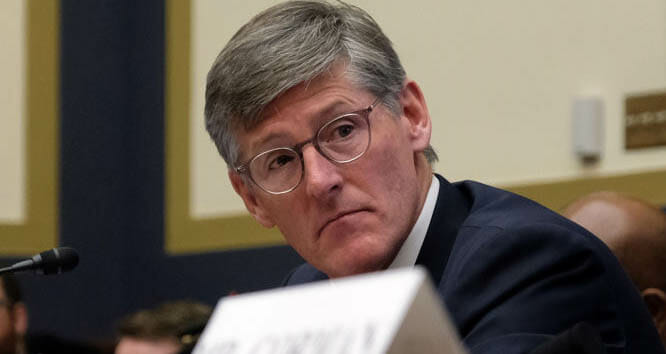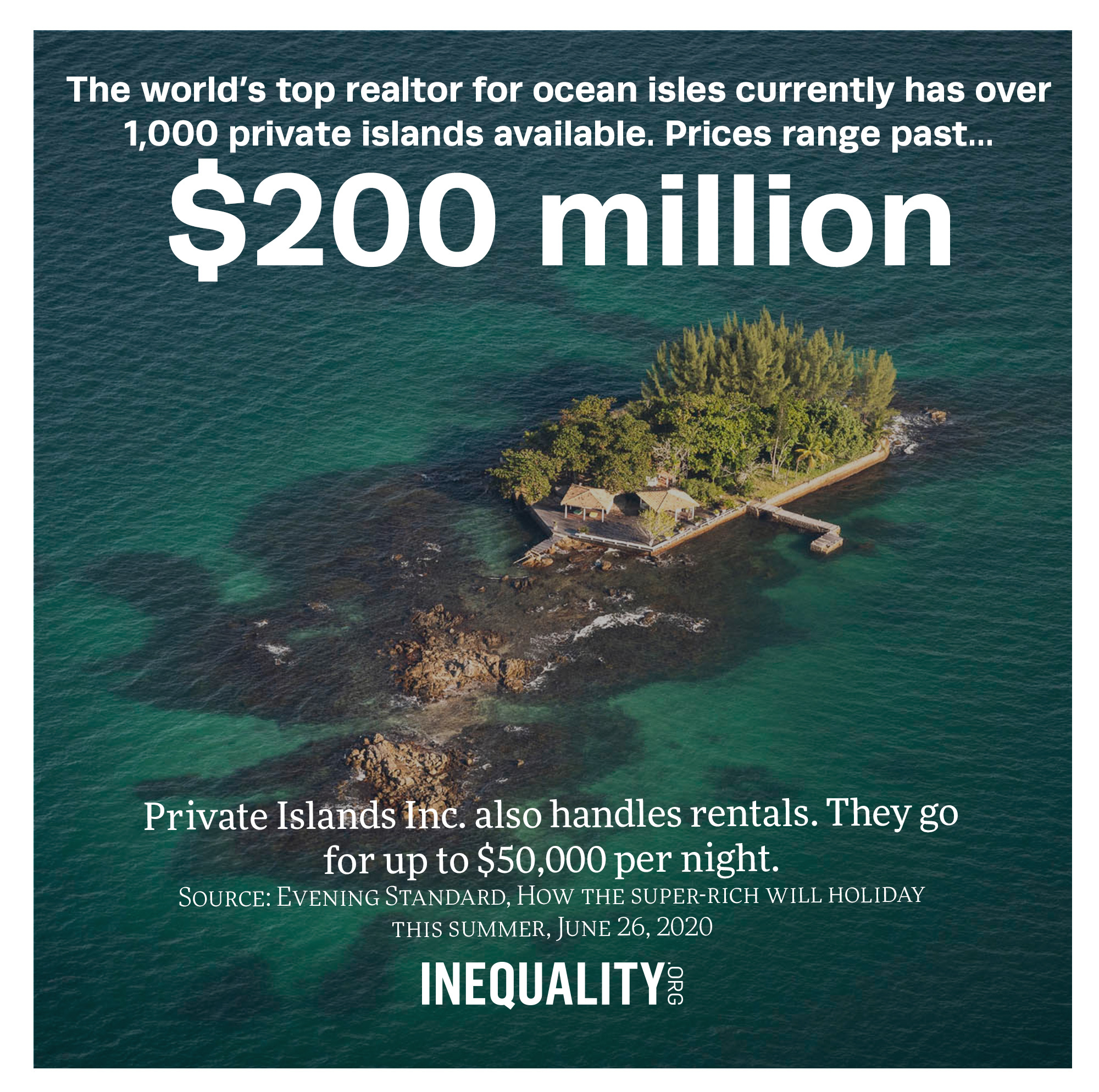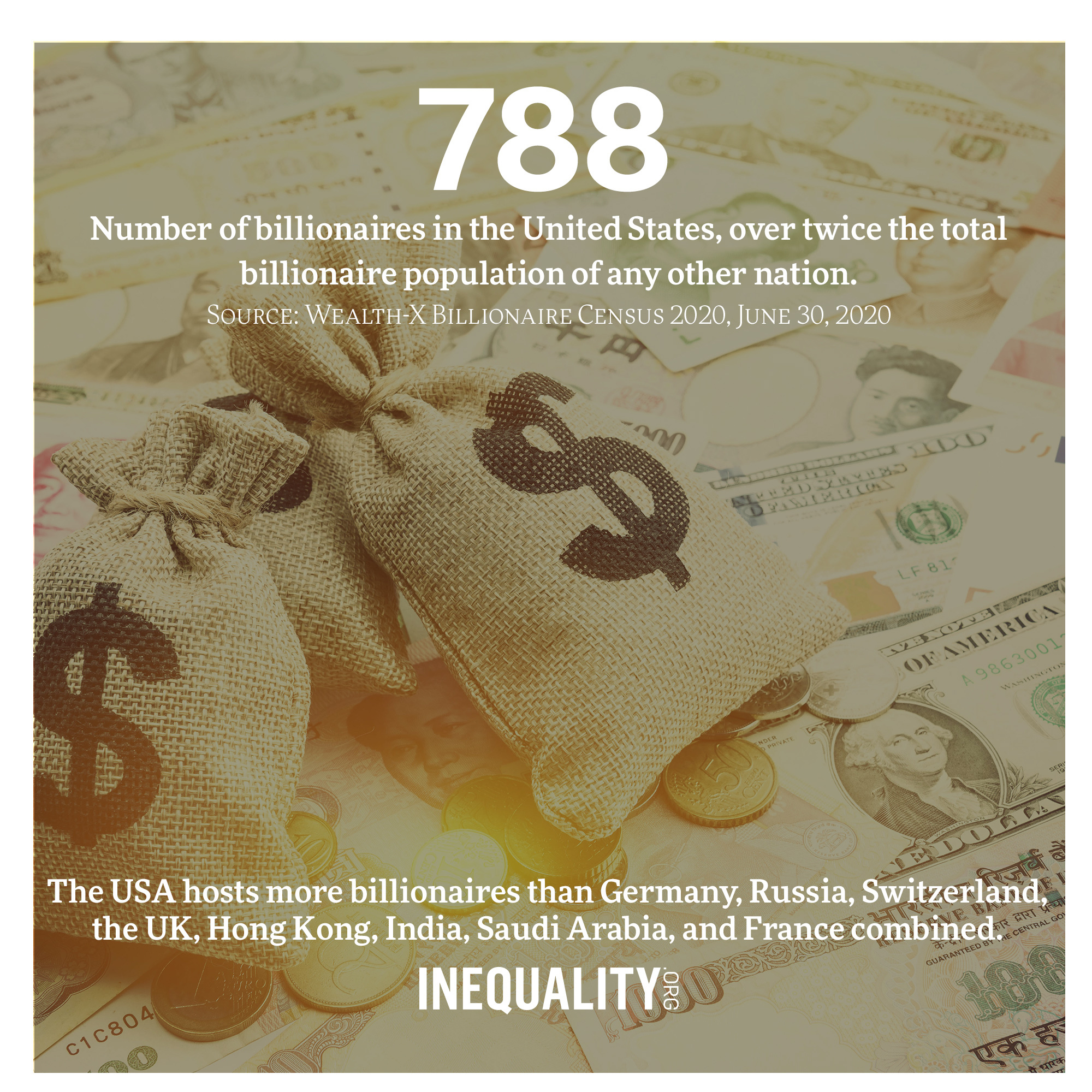| THIS WEEK |
|
People across the United States had a broad range of options for marking the Fourth of July. Some celebrated, some protested. Many also worked throughout this past weekend, putting their lives in pandemic danger while their elected officials shrug their shoulders at the rising corona caseload.
Still others among us spent the Fourth of July worrying about how to pay rent and medical bills in a country that doesn’t treat either housing or healthcare as basic human rights.
The United States has a long way to go to recognize the interdependence needed to create equitable political and economic systems. More this week on the Indigenous activists who’ve won back-to-back victories for equity and a bold new proposal that puts a squeeze on Wall Street to create jobs that pay at least $15 an hour in our nation’s hardest-hit communities.
Chuck Collins, for the Institute for Policy Studies Inequality.org team
|
|
| |
|
| INEQUALITY BY THE NUMBERS |
 |
|
|
|
| |
|
| FACES ON THE FRONTLINES |
 |
| Double Wins for Water Protectors |
| After years of resistance, Indigenous communities and climate activists are now celebrating back-to-back victories: the shutdown of two highly controversial pipelines. On Sunday, Dominion Energy and Duke Energy announced the cancellation of the Atlantic Coast Pipeline. The Supreme Court last month gave these two companies a free pass over a regulatory hurdle. But the companies still faced the prospect of more extra costs and delays as frontline organizers continued their struggle. That prospect made the pipeline economically untenable. Meanwhile, a federal judge has just issued a ruling that shuts down and empties the Dakota Access pipeline pending review, a major win for the Standing Rock and Cheyenne River Sioux Tribes. More this week on organizers’ reactions to their success. |
|
| |
|
| WORDS OF WISDOM |
 |
|
|
|
| |
|
PETULANT PLUTOCRAT
OF THE WEEK |
 |
| Financial Fragility? Phooey, Says Citigroup’s Chief |
| Citigroup CEO Michael Corbat has a good thing going. Corbat pocketed $24 million last year and $24 million the year before. This year, Citibank, the world’s largest credit card issuer, has an even better thing going. Citi is paying just 0.35 percent interest on corona-crisis loans from the Federal Reserve and charging customers as much as 27.4 percent in credit-card interest. That spread is generating oodles of dollars that Corbat would like to pass on to Citi shareholders like himself. But the Federal Reserve wants Citi and other big banks to sit on their cash as a guard against a financial system crash, and last month announced mild limits on the dividends banks can shell out. Corbat remains unimpressed by Fed worries about financial fragility. Notes the Citi CEO: “From our perspective, our dividend is sound, and we plan on continuing to pay it.” Corbat’s solicitude for the well-being of his shareholders doesn’t seem to extend to his customers. This past spring, Citi accounted for four times more credit-card complaints to federal regulators than any other major bank.
|
|
| |
|
| BOLD SOLUTIONS |
 |
| Shrink Wall Street to Guarantee Good Jobs |
| The coronavirus pandemic has claimed nearly 15 million U.S. jobs at the same time high-flying financial traders are making killings off the market volatility the crisis has caused. U.S. Representatives Bonnie Watson Coleman and Ilhan Omar have a promising new response. They’ve introduced a bill that would tax Wall Street windfalls to guarantee good jobs for people in high-unemployment areas. Jobs With Justice Executive Director Erica Smiley sees the bill as a way to increase worker power: “Working people who stand up to corporate bosses and get fired face loss of income, loss of housing, loss of medical care, and food insecurity.” Passage of the Workforce Promotion and Access Act, she adds, would blunt “the threat of firing” and give working people a broader role in our economic system. |
|
| |
|
| GREED AT A GLANCE |
 |
|
|
|
| |
|
| TOO MUCH |
 |
| Social Distancing for Mega-Million Fun and Profit |
| For the world’s super rich, the thrills don’t come cheap. But they do keep coming — even amid a pandemic. Case in point: last week’s historic Sotheby’s art auction, the first-ever “hybrid” sale of high-end artwork. On site in London, Hong Kong, and New York, socially distanced Sotheby’s specialists took in phone and online bids for four-and-a-half hours of often breathless auctioneering. One spirited round of bidding involved an untitled Jean-Michel Basquiat painting that sold for $398,500 back in 2000. At Sotheby’s inaugural pandemic-time auction last Monday, the same work went for $15.2 million. Irrational exuberance, anyone? And what has the world’s rich so suddenly exuberant? Inequality.org co-editor Sam Pizzigati has more. |
|
|
|
| |
|
| MUST READS |
This week on Inequality.org
Bob Lord, Welcome to Hectobillionaire Land. The concentration of America’s wealth has gone into overdrive.
Colin Powers Leila Dal Santo, Flawed Anti-Poverty Programs Leave the Poor Vulnerable to Catastrophe in Middle Eastern Countries. Means-tested cash transfer programs are leaving huge numbers of the poor in Jordan, Palestine, and Lebanon without the help they need during the crisis.
Elsewhere on the Web
Catherine Thorbecke and Arielle Mitropoulos, 'Extreme inequality was the preexisting condition': How COVID-19 widened America's wealth gap, ABC News. Some 45 million Americans have lost their jobs since the pandemic hit. U.S. billionaires, meanwhile, have made $584 billion.
Paul Krugman, Why Do the Rich Have So Much Power? New York Times. Huge disparities in income and wealth translate into comparable disparities in political influence. A look at one telling example.
Carlos Oronce, Christopher Scannell , Ichiro Kawachi, and Yusuke Tsugawa, Association Between State-Level Income Inequality and Covid-19 Cases and Mortality in the USA, Journal of General Internal Medicine. States with higher income inequality, a new medical study finds, have experienced a higher number of Covid-19 deaths.
Matt Bruenig, The Racial Wealth Gap Is About the Upper Classes, People's Policy Project. Overall racial wealth disparity reflects almost entirely the disparity between wealthiest 10 percent of white and Black households.
Jill Barshay, A decade of research on the rich-poor divide in education, Hechinger Report. The school funding gap between the wealthiest 1 percent of U.S. school districts and average school districts has widened by 32 percent over the last 15 years.
Andrew Kahrl, Who Will Get to Swim This Summer? New York Times. History is repeating itself as pools, beaches, and clubs open — but mostly for the privileged few.
Josh Eidelson, How the American Worker Got Fleeced, Bloomberg. Over the years, bosses have held down wages, cut benefits, and stomped on employee rights. Covid-19 may help change that.
Jeffrey Sachs, How Inequality Fuels COVID-19 Deaths, Project Syndicate. We are witnessing once again the cost of mass inequality: inept governance, social distrust, and a huge population of vulnerable people unable to protect themselves from encroaching harms.
Luke Hildyard, To ‘build back better,’ we must tackle executive pay, Open Democracy. CEO-worker pay ratio disclosures have become part of corporate reporting on both sides of the Atlantic. These ratios can be a reliable yardstick of our progress against income inequality.
David Leonhardt and Yaryna Serkez, The U.S. Is Lagging Behind Many Rich Countries. These Charts Show Why, New York Times. A look at the stunning difference between the level of inequality in the United States and the level in Europe.
Bob Hennelly, As COVID-19 deaths hit record numbers, Trump oversees a historic wealth transfer to the super-rich, Salon. Trump and his fellow oligarchs are overseeing an economic collapse that's hitting communities of color the hardest.
Ashley Mears, The secret economics of a VIP party, Economist. A small cohort of oligarchs, New York hedge-fund managers, and Silicon Valley investors now patronize a network of global nightclubs where deep pockets will spend $100,000 on alcohol in a single night.
Jacqueline Rabe Thomas, One of America’s Wealthiest States Might Pass Up an Opportunity to Tackle Housing Segregation, ProPublica. “Jim Crow Zoning” allows Connecticut’s wealthiest towns to shut out more affordable housing -- and the minorities who would live in that housing.
Mary Retta, Online Learning Isn’t Even Remotely Equal, Nation. Robber baron tech barons multiply their billions while poor students fall further and further behind. |
|
| |
|
| A FINAL FIGURE |
 |
|
|
|
| |
|
|